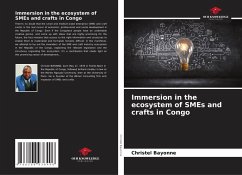
Influence of Cooperative on Social Development
Versandkostenfrei!
Versandfertig in 6-10 Tagen
40,99 €
inkl. MwSt.

PAYBACK Punkte
20 °P sammeln!
Many youth of Cibitoke province who work in cooperative have the salaries which permit them to get their needs. The results show that 87% of respondents after getting job income increased. The second objective of the study was to find out how job creation improved living conditions. The results show many respondents whether 75% responded that their families eat one time per a day before getting job and 65% responded before getting job their house was built with soil, 93% responded after getting job their house were built with bricks. The third objective of the study was to find out how job cre...
Many youth of Cibitoke province who work in cooperative have the salaries which permit them to get their needs. The results show that 87% of respondents after getting job income increased. The second objective of the study was to find out how job creation improved living conditions. The results show many respondents whether 75% responded that their families eat one time per a day before getting job and 65% responded before getting job their house was built with soil, 93% responded after getting job their house were built with bricks. The third objective of the study was to find out how job creation reduced unemployment rate before getting job unemployment rate was 94% while after getting job unemployment rate was 65%. Primary data were collected using questionnaire as qualitative oriented research where secondary data were collected using record of other researchers. The results were reported in tables and summarized answers to major questions asked: closed questions and open questions were used. Basing on the findings the researcher confirms that: Job creation has influence on social development.












